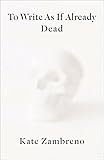To Write as if Already Dead/ Kate Zambreno
Material type: TextPublication details: Columbia University Press; 2021Description: 176p; 20x13cmISBN:
TextPublication details: Columbia University Press; 2021Description: 176p; 20x13cmISBN: - 9780231188456
| Item type | Current library | Collection | Call number | Status | Date due | Barcode |
|---|---|---|---|---|---|---|
 Book
Book
|
SAF Reference Library | Language and Literature | PN3311-3503 260.228 (Browse shelf(Opens below)) | Available | 4969 | |
 Book
Book
|
SAF Reference Library | Language and Literature | PN3311-3503 260.228 (Browse shelf(Opens below)) | Available |
Browsing SAF Reference Library shelves, Collection: Language and Literature Close shelf browser (Hides shelf browser)

|
No cover image available No cover image available | No cover image available No cover image available |

|

|

|

|
||
| PN3311-3503 209.82 The Time Regulation Institute/ | PN3311-3503 225.604 Cat's Cradle/ | PN3311-3503 225.604 Cat's Cradle/ | PN3311-3503 260.228 To Write as if Already Dead/ | PN3311-3503 260.228 To Write as if Already Dead/ | PZ(1)-90 201.531 The Adventures of Tintin: The Red Sea Sharks/ | PZ(1)-90 201.531 The Adventures of Tintin: The Red Sea Sharks/ |
To Write As If Already Dead circles around Kate Zambreno’s failed attempts to write a study of Hervé Guibert’s To the Friend Who Did Not Save My Life. In this diaristic, transgressive work, the first in a cycle written in the years preceding his death, Guibert documents with speed and intensity his diagnosis and disintegration from AIDS and elegizes a character based on Michel Foucault. The first half of To Write As If Already Dead is a novella in the mode of a detective story, searching after the mysterious disappearance of an online friendship after an intense dialogue on anonymity, names, language, and connection. The second half, a notebook documenting the doubled history of two bodies amid another historical plague, continues the meditation on friendship, solitude, time, mortality, precarity, art, and literature. Throughout this rigorous, mischievous, thrilling not-quite study, Guibert lingers as a ghost companion. Zambreno, who has been pushing the boundaries of literary form for a decade, investigates his methods by adopting them, offering a keen sense of the energy and confessional force of Guibert’s work, an ode to his slippery, scarcely classifiable genre. The book asks, as Foucault once did, “What is an author?” Zambreno infuses this question with new urgency, exploring it through the anxieties of the internet age, the ethics of friendship, and “the facts of the body”: illness, pregnancy, and death.
English

There are no comments on this title.